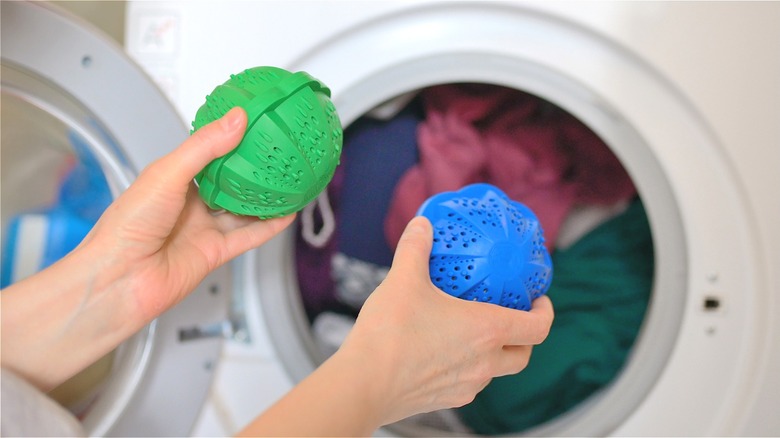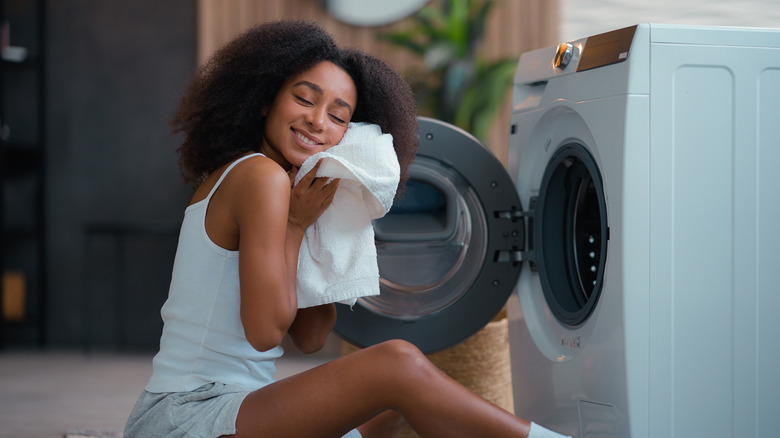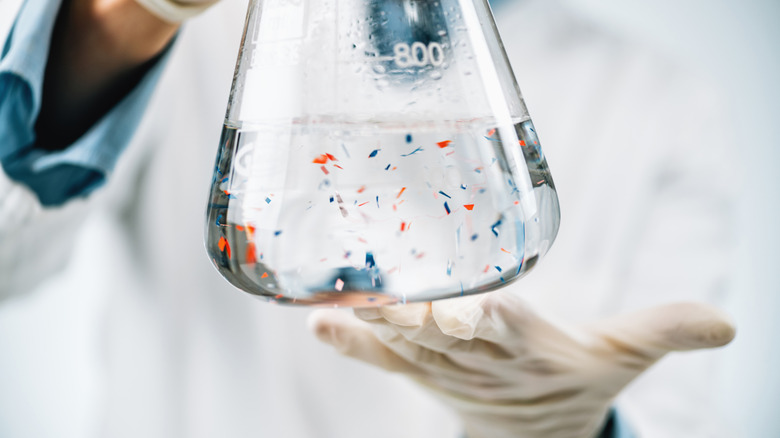Is Ceramic Pellet Technology Going To Change How You Do Laundry?
We may receive a commission on purchases made from links.
Laundry detergents are the usual go-to when you need a clean load of clothes. But with how toxic laundry detergents can be, natural, chemical-free alternatives are constantly being developed. Laundry balls are one of the many things you can substitute for laundry detergents. They come in three distinct types: magnetic, detergent-pellet, and the more common bio-ceramic pellet. These softball-sized bio-ceramic laundry balls contain hundreds of tiny bio-ceramic pellets designed to remove dirt and bacteria without needing detergent. But we can't say for sure if it is the laundry game-changer it claims to be.
Before questioning if this product really works, let's look at the technology behind them. These balls typically come with ridged and perforated surfaces that create friction when they are agitated with your clothes in the washer. Basically, they mechanically clean your clothes using the same principle as traditional washboards. The ceramic pellets inside the balls may contain different materials or have varying functions, depending on the brand. For example, the Laundry Masher has beads infused with nano-silver that is known to have antibacterial properties, while The Orb by Tyent USA contains ceramic and antibacterial pellets. The BERON Eco-friendly Wash Ball contains beads with different functions such as alkali pellets, far-infrared pellets, chlorine-removal pellets, and anti-microbial pellets. But in all these cases, the basic function of the inner ceramic pellets is to increase the pH of the water. A pH between 7 and 8 is great for removing dirt and oil stains while leaving your fabric safe. Since tap water typically has a pH of 7.5, a slight increase is expected to aid washing.
Benefits of ceramic-pellet laundry balls
One perk that's a major selling point of these products is their chemical-free nature. Detergents and laundry soaps are made with toxic chemicals that can sometimes be harmful to people and the environment. In the interest of being healthy and consumer-friendly, the ceramic pellets inside laundry balls are made with materials like tourmaline. Tourmaline has been shown to have anti-inflammatory and skin-soothing properties, making washed clothes safer for babies and people with sensitive skin. At the same time, the laundry balls are gentle on clothes and safe to use for many different fabrics.
Another attractive feature of laundry balls is their reusability. Companies making these products state that you don't need other laundry resources as the balls only need to be placed under the sun for an hour to refresh them about once a month. As a result, you can use them for multiple wash cycles before needing a refill of the pellets. Considering the reusable nature of laundry balls, they are cost-effective in the long run, saving you from the need to buy laundry detergents and fabric softeners. These laundry balls are equally environment-friendly for many reasons. Firstly, because they eliminate your need for detergents, you'll be reducing the introduction of toxic chemicals from your laundry wastewater into waterways and the atmosphere. On another note, you'd also reduce the waste typically generated by using multiple packs of detergent. Finally, you can save more water, as there's no need for a rinse cycle with these balls because they don't contain any ingredients that need to be rinsed away.
What are the downsides of this technology?
A research study published in the Sustainability journal points out that these balls increase the incidence of microfiber shedding from synthetic materials during laundry. Microfibers are microscopic fibers about one-fifth the size of human hair and shed from textile-based materials. They are the most common type of microplastics in the environment, with known harmful effects on humans, animals, and nature. This con is a major blow to the eco-friendly advantage of bio-ceramic laundry balls. If you wash clothing with 100% natural materials, however, the fibers shed by laundry balls may not be such a concern.
Another major problem with laundry balls is their inability to match the manufacturers' claims. The science behind the claims is valid, but there isn't enough substantial evidence to prove these products are as effective as they say. The user reviews vary widely, with some people criticizing it and others praising it. We tested the Ecoegg on our laundry here at House Digest, a detergent-pellet type of laundry ball, and the results were subpar. However, more research may be necessary before forming a strong conclusion about the bio-ceramic versions. Some users have also complained that the plastic containers of the Laundry Masher brand sometimes fall apart in the washer, forcing them to pick the pellets out. Loose pellets could also cause damage to your washing machine. Clearly, these laundry balls are onto something with their ceramic pellet technology. They do have the potential to revolutionize laundry as we know it, but there are cons that you can't ignore before buying them.


